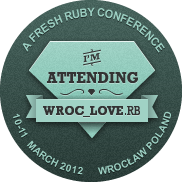Ruby Tricks & Quirks #2. Call a method using case ... when
10 February 2011
Problem
I’ve recently noticed I often use code like that.
class Offer
def available?
end
def cancelled?
end
def postponed?
end
end
if offer.available?
order.submit
elsif offer.cancelled?
order.reject
elsif offer.postponed?
order.postpone
else raise UnknownStateError.new
end
if/else statements looks like perfect candidates for case … when statement. In particular I’d like to have something like that:
case offer
when :available? then order.submit
when :cancelled? then order.reject
when :postponed? then order.postpone
else raise UnknownStateError.new
Looks better, right? Of course it doesn’t work out of the box. We’ll try to overcome it but first some theory.
case/when uses === method internally. In particular ruby calls code like this:
:available?.===(offer)
…which will always return false when compared to non-symbol. Triple equals (===) is slightly different that double equals (==) so be awared when each of them is called.
Solution
When we know what is going under the hood it is easy to slightly modify the behaviour to fit our needs.
class Symbol
alias :original_triple_equals :"==="
def ===(object)
original_triple_equals(object) ||
(object.respond_to?(self) && object.__send__(self))
end
end
We override triple equals and try to call a desired method if original behaviour returns false. Let’s test it
case []
when :empty? then puts "that works!"
else puts "something went wrong"
Works like a charm.
Performance
There is no doubt performance will be affected. Let’s benchmark performance of comparing symbols.
REPEAT = 1_000_000
Benchmark.bm do |x|
x.report("original ===") do
REPEAT.times { :s1.original_triple_equals(:s2) }
end
x.report("overriden ===") do
REPEAT.times { :s1.===(:s2) }
end
end
Ruby 1.8:
user system total real
original === 0.610000 0.170000 0.780000 ( 0.782712)
overriden === 1.530000 0.330000 1.860000 ( 1.852536)
Performance hit: 238%
Ruby 1.9:
user system total real
original === 0.180000 0.000000 0.180000 ( 0.187665)
overriden === 0.580000 0.000000 0.580000 ( 0.576526)
Performance hit: 322%
Benchmark isn’t the most accurate but let’s approximate that decrease in performance is 200%-400%. Is it much? It depends how often you symbols are compared but under some circumstances it may lead for serious performance problems. I warned you.
Ruby 1.9
Ruby 1.9 comes with a new method of calling blocks.
proc { puts "it looks awkward" }.===
It gives us some cool capabilities. Take a look at that example.
How does it help us calling methods in case … when statement? Frankly… not much :) But we can do some interesting tricks for fun and profit.
case []
when :empty?.to_proc then puts "empty array"
else puts "Ruby 1.9?"
end
We convert Symbol to proc which was introduced in Ruby 1.8.7 and then case … when calls proc.=== implicity. Of course calling to_proc each time isn’t very helpful and readability is even worse.
Quite better solution which comes to my mind is to introduce a method which takes a symbol and call to_proc on it. The method should be globally accessible so we have to define it at kernel level.
module Kernel
def is(symbol)
symbol.to_proc
end
end
case []
when is(:empty?) then puts "empty array"
else puts "Ruby 1.9?"
end
Unfortunately we can’t skip parentheses here.
There is a big benefit here. We don’t override symbol.=== so performance remains unaffected. On the other hand polluting Kernel namespace is a certain drawback.
Of course Ruby 1.9 solution may be implemented in Ruby 1.8 as well. You would just need to implement Proc#=== method.
Update: Jacob’s Solution
Jacob Rothstein introduced very neat solution using hashes and lambdas. It doesn’t use case … when statement at all but behavior is very similar.
class Object
def switch( hash )
hash.each {|method, proc| return proc[] if send method }
yield if block_given?
end
end
# which allows us to write functional-like code
offer.switch(
available: -> { order.submit },
cancelled: -> { order.reject },
postponed: -> { order.postpone }
) { raise UnknownStateError.new }
It depends on new lambda syntax and ordered hashes so Ruby 1.9 is required. This is very clear and doesn’t pollute Symbol#=== method. Read full explanation here.
